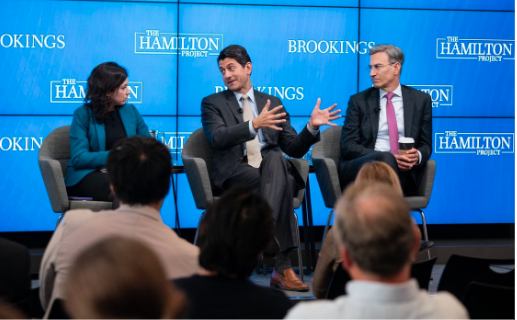By: AIF Staff
Washington, DC – Last week, the Brookings Institution hosted a policy event with The Hamilton Project where AIF President Paul Ryan and former Congressional Budget Office Director Peter Orzag shared their thoughts on the future of U.S. tax policy with the Washington Post’s Katherine Rampell. With a significant number of provisions in the Tax Cuts and Jobs Act set to expire at the end of next year and with economic growth lagging, Orzag and Ryan discussed how both parties can identify common ground when it comes to tax policies.
Video of the panel conversation with Ryan, Orzag, and Rampell is accessible here. A summary of the day’s events can be accessed at this link and excerpts from Ryan’s comments, edited lightly for clarity, follow.

Ryan on why certain parts of the Tax Cuts & Jobs Act are temporary & some are permanent:
“First of all, we wrote our budget resolution to the current policy baseline that [Peter Orzag] just described. The current policy rolled over with the fiscal cliff deal that Boehner and Obama did. And then, Kevin Brady and I decided that we would make permanent that which we thought, for economic reasons and for political reasons, needed to be made permanent – like the corporate rate and the territorial system. We made temporary that which we thought had a better chance of withstanding an extension under any conceivable political arrangement in the future – like the individual income tax provisions, expensing, section 199. So, we made temporary what we thought could get extended and we made permanent what we thought might not get extended and what we wanted to keep permanent.”
**
“We wanted to convert from a worldwide system to a territorial system and get our rates down to globally competitive rates. If you throw in the average 4.8% state and local rate, we’re basically in the middle of the pack, which is where we wanted to be. And we knew that inversion decisions were happening at larger companies and so, we wanted to make sure the companies who were, at the time, seeking to redomicile never thought about doing that again and that inversions would stop. So, we really believed for economic reasons that we needed to make [these provisions] permanent — the reduction in the corporate rate and the conversion over to a territorial system. We also thought that should we have, say, divided government or lose control of all three of the House, the Senate, and the White House, that it would be easy for the corporate rate to snap back up and it would be very bad for our economy. So, we made that permanent.”
Ryan on how our big fiscal issues will ‘break’ and spur reform:
“I would like to think we can have a better tax system than the one we have today without hurting GDP growth. Frankly, I’m very worried about it. Look, the Congressional Budget Office is telling us we’re going to grow at 1.3% for the next 30 years. That’s mostly a labor force participation point, but I’d like to do some things that can get that [growth] line up. What I don’t want to do is gravitate toward a tax policy that’s going to lower that line…
“If we can get tax reform, entitlement reform, and immigration reform, that combination could be a pretty damn good thing for economic growth in this country. We have terrible politics that are preventing that from happening right now, but all three of those issues are going to break. At least, that’s the way I’ve seen it happen based on my 25 years on the Hill — 20 as a Member of 5 as a staffer.”
“Issues break and they seem intractable until that happens, but these issues are going to break. I don’t know exactly when, but they’re going to break…. And when I say break, I mean break as in they’re going to get to such a point that we just have to do something about it. And that does happen.
“I think that’s going to happen on immigration. I think it’s definitely going to happen on entitlements because of the trust funds. And I think it can happen on tax reform and on carbon.”
###
